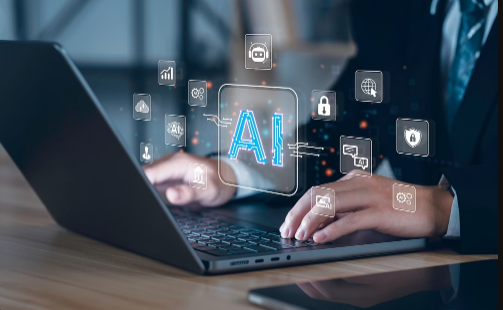originally posted on: https://www.netlz.com/blog/how-artificial-intelligence-is-transforming-the-e-commerce-industry/
As an e-commerce entrepreneur, you’ve likely encountered the term artificial intelligence (AI) before.
You might have even contemplated employing AI to enhance your business operations. But what exactly is AI, and how can it benefit your e-commerce enterprise? Between 2015 and 2021, worldwide corporate investment in AI soared from 12.75 billion to a staggering 93.5 billion US dollars.
Furthermore, by 2023, it is projected that most businesses leveraging AI for digital commerce will experience over a 25% improvement in customer satisfaction, revenue, or cost reduction. This rapid growth underscores the faith companies have in AI and its potential impact.
What is Artificial Intelligence?
AI, a subfield of computer science, focuses on developing intelligent agents – systems capable of reasoning, learning, and functioning autonomously. In recent times, AI has significantly advanced in areas like understanding and interpreting human language, recognizing objects and faces, and making data-driven predictions. These advancements have led to numerous AI applications in e-commerce, including customer support chatbots and recommendation engines that personalize shopping experiences.
As AI progresses, we can expect the emergence of innovative and advantageous applications, revolutionizing e-commerce in unimaginable ways. Consider AI as an assistant rather than an executor.
Examples of AI in Large E-Commerce Empires
Currently, numerous studies indicate that AI adoption in e-commerce businesses remains limited. Nonetheless, this figure is anticipated to surge in the coming years, with 83% of companies identifying AI as a crucial component of their business strategies.
The swift adoption of AI can be attributed to the expanding accessibility of AI services, decreasing costs of AI-powered hardware, and the increasing awareness of AI’s potential advantages. As more e-commerce businesses tap into AI’s capabilities, the industry is likely to undergo even more significant transformations.
Prominent e-commerce entities utilizing AI include Amazon, Alibaba, and eBay.
Amazon AI E-Commerce
When people think of ecommerce, one of the first companies they usually think of is Amazon. What people don’t realize is that Amazon also has a large role in the rise of artificial intelligence (AI). For many years now, Amazon has been using AI to help power its ecommerce business and is showing zero signs of slowing down. One of the ways that Amazon uses AI for ecommerce is through its recommendation engine.
Amazon’s AI system utilizes customer data to deliver tailored product recommendations and enhance search engine results. By comprehending the intent behind customer queries, Amazon AI personalizes the user experience. Additionally, Amazon employs AI to optimize its logistics processes. Amazon’s AI logistics division leverages predictive algorithms to forecast customer demand and efficiently route products. As demonstrated, AI contributes significantly to Amazon’s e-commerce success. Given the company’s substantial resources, it is poised to remain at the forefront of this domain.
Alibaba AI E-Commerce
As the world’s largest online and mobile commerce company, Alibaba amassed over $485 billion in sales in 2018. The company employs artificial intelligence (AI) in various ways to enhance its platform and services. For instance, Alibaba’s retail platform, Taobao, leverages AI to customize marketing recommendations for each user. Cainiao, the company’s logistics subsidiary, utilizes AI to optimize package sorting and delivery times, resulting in a 40% reduction in logistics errors.
Furthermore, Alibaba employs AI to combat counterfeiting and fraud on its platform. By analyzing images and text, the company can swiftly identify and eliminate fake or illegal products from its marketplace. This use of AI solidifies Alibaba’s position as an e-commerce industry leader.
eBay AI E-Commerce
eBay, a leading secondhand online marketplace, boasts millions of users across the globe. The platform harnesses artificial intelligence (AI) to enhance user experiences and facilitate connections between buyers and sellers. AI is employed to tailor the eBay website for each user, based on their unique interests and browsing history.
As a result, users encounter more relevant search results and can easily find products similar to those they have previously viewed. Utilizing machine learning, eBay identifies patterns in user behavior and recommends items that may pique their interest. Through AI implementation, eBay streamlines the shopping experience, making it more efficient and enjoyable for users.
6 Ways That AI is Changing E-Commerce
AI is unlocking new opportunities in personalization, automation, and predictive analytics. Consequently, companies that adopt AI are experiencing growth in sales, enhanced customer satisfaction, and greater efficiency.
Below are some examples of how AI is revolutionizing e-commerce:
Customer Service Improvements
One of the most significant and noticeable ways AI is revolutionizing e-commerce is through enhanced customer service. Utilizing chatbot platforms, businesses can now offer round-the-clock customer support at a fraction of the cost compared to traditional customer service teams.
Since chatbots don’t experience fatigue or require breaks, they can deliver a level of service that surpasses human capabilities. A prime example of AI improving customer service and sales is live chat. It’s crucial to recognize that chat is not just a support channel. Chatbots, often equipped with over 30+ targeting rules and intelligent customer routing, can effectively manage resources, boost productivity, and reduce costs.
Better Inventory Management
AI also has a considerable influence on inventory management. By gathering data from previous sales, weather patterns, and social media trends, AI enables businesses to predict future demand with remarkable precision. With AI’s assistance, companies can stock the appropriate products at the right moment, lowering inventory expenses and satisfying customers who can locate the items they desire when they need them.
Seasonal Predictions (Like Black Friday)
AI serves as a remarkable asset for retailers, particularly during the bustling holiday season. Forecasting inventory and identifying items in need of restocking can help reduce waste in e-commerce stores.
Simultaneously, sales increase as shoppers can readily acquire what they need without resorting to waiting lists, which often cause buyer friction and decreased sales. Furthermore, AI can generate personalized Black Friday suggestions based on data sets or preferences identified in prior searches- enhancing customer experience while saving time!
AI Personalization
AI’s influence on e-commerce is most prominently felt in the realm of personalization. Companies can now harness AI to customize shopping experiences for their customers by gathering data on previous behavior.
From suggesting products that align with customer interests to presenting personalized deals and promotions, AI streamlines the process of offering customers precisely what they desire and marketing the appropriate services using the right AI tools.
Detection of Fraud
A crucial aspect in which AI is revolutionizing e-commerce is through fraud detection. For instance, businesses can now pinpoint fraudulent activities with remarkable precision by analyzing data points such as IP addresses, email addresses, and credit card numbers, all performed by a computer configured for this detection task. AI safeguards businesses from losses and fosters trust with customers by demonstrating that their information is secure.
Content Creation
AI is also revolutionizing e-commerce by assisting businesses in producing superior content. As every e-commerce business understands, content is paramount. The right content, from product descriptions to accompanying images, can make a significant difference in a customer’s purchasing decision.
However, crafting high-quality copy can be both time-consuming and costly. This is where AI steps in. Employing machine learning algorithms, AI enables businesses to generate improved content more quickly and at a reduced expense. For instance, AI can help identify the most conversion-prone product images or create search engine-optimized product descriptions. Consequently, AI is simplifying the process for businesses to develop content that drives sales.





